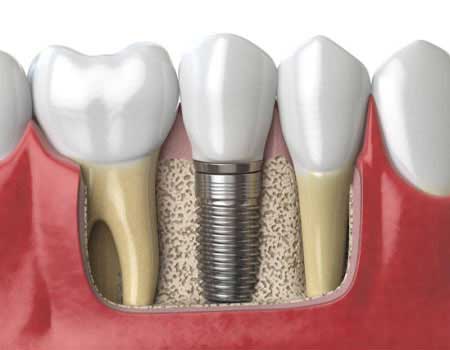While a tooth is lost because of injury or disease, a person can experience complications like rapid bone loss, defective speech, or changes to chewing patterns that result in discomfort. Replacing a lost tooth with a dental implant can significantly enhance the patient's quality of life and health.
Dental implant itself is a small titanium post that is surgically placed into the jawbone to restore a person's ability to chew or their appearance.
The process of getting a dental implant in Vijayawada usually involves several steps:
- Assessment and Planning: The initial step is a complete dental exam and evaluation to determine if you are a suitable candidate for dental implants. This may involve X-rays, CBCT scans, and impressions of your teeth and jaws. The dentist or oral surgeon will assess the quality and quantity of the jawbone to ensure it can support an implant.
- Implant Placement: The dental implant is placed into the jawbone during a surgical procedure. This is typically performed under local anesthesia, but sedation options may be available for those who are anxious. The gum tissue is opened, and a hole is drilled into the jawbone where the implant will be positioned. After the implant is placed, the gum tissue is stitched closed.
- Osseointegration: The healing process starts after the implant placement. Over the next few months, the implant integrates with the jawbone through osseointegration. This provides a stable foundation for the replacement tooth.
- Placement of abutment: Once the implant has fused with the jawbone, a small connector called an abutment is attached to the implant. The abutment serves as a connection between the implant and the replacement tooth.
- Crown or Prosthesis Placement: Finally, a custom-made crown or prosthesis (bridge or denture) is attached to the abutment. The replacement tooth is designed to match the color, shape, and size of your natural teeth, providing a natural-looking result.

Time
It takes around minimum of least 6 months, as it is performed in two phases:
- Implant is put in the jaw and is left for it to bond with the bone and to heal completely. This requires atleast 3 months in case of lower jaw and 6 months in case of upper jaw.
- Once this is established, the replacement tooth is appended to the implant.
After the procedure
Whether you have dental implant surgery in one phase or multiple stages at best dental clinics in Vijayawada, you might encounter some of the typical discomforts related with any type of dental procedure, like:
- Swelling of your gums and face
- Bruising of your skin and gums
- Pain at the implant site
- Minor bleeding
You might require pain meds or antibiotics after dental procedure. If swelling, discomfort or some other issue deteriorates in the days after surgery, contact your best dental implantologist in Vijayawada.
After each phase of a surgery, you might need to eat soft foods while the surgical site heals. Normally, your surgeon will use stitches that dissolve on their own. If your stitches aren't self-dissolving, your doctor eliminates them.
Who is the right candidate for Dental implants?
People who meet the following criteria are the right candidates for dental implants:
- Good Oral Health: The candidate should have overall good oral health, including healthy gums and sufficient jawbone density to support the implant.
- Commitment to Oral Hygiene: Dental implants require regular oral hygiene maintenance. Candidates should have a commitment to maintaining good oral hygiene practices, including daily brushing and flossing and regular visits to the dentist.
- Sufficient Jawbone Density: Adequate bone density in the jaw is necessary to provide a stable foundation for the implant. If a candidate has experienced significant bone loss, they may require a bone graft procedure to augment the jawbone.
- No Uncontrolled Chronic Conditions: Candidates should not have any uncontrolled chronic conditions such as diabetes or heart disease that can affect the healing process and increase the risk of complications.
- Non-Smoker or Willingness to Quit Smoking: Smoking can hinder the healing process and increase the risk of implant failure. Candidates who smoke are typically advised to quit or reduce smoking significantly before and after the implant procedure.
- No Teeth Grinding (Bruxism): Individuals who have a habit of teeth grinding or clenching (bruxism) may not be suitable candidates. Bruxism can put excessive pressure on the implants and increase the risk of implant failure.
- Age Considerations: There is no strict age limit for dental implants. However, candidates should have finished growing, so implants are typically not recommended for children or young teenagers.
Get your immediate dental implants in Vijayawada
What are the advantages of dental implants?
Dental implants provide a wide range of benefits. They can:
- Improve speech and chewing ability.
- Enhance the appearance of your smile.
- Secure permanent or removable bridges and dentures.
- Give teeth replacement without altering your neighbouring teeth.
Tooth loss can negatively affect everyday life. While you're missing teeth, it may be difficult to speak or chew appropriately. Dental implants offer a long-term solution, and your dental specialist can tailor treatment to your unique needs.
Whether you're missing one tooth, few teeth or all of your teeth, dental implants might be an option for you.